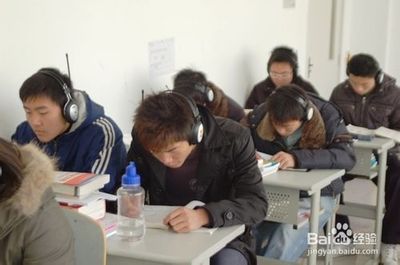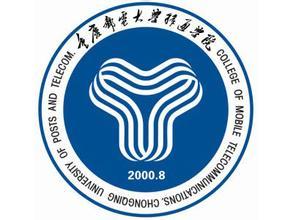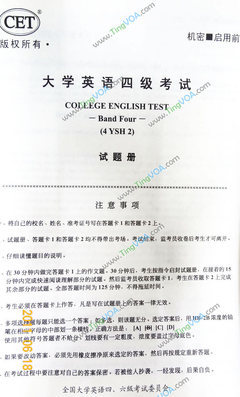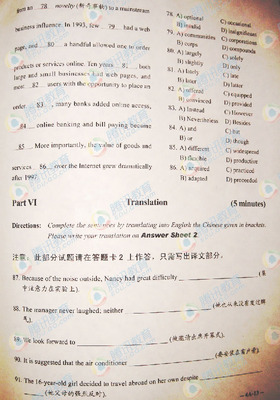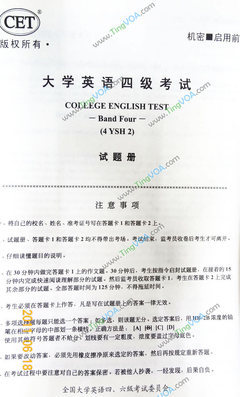大学英语(CET--4) 语法学习提纲
一、词类、句子成分和构词法:
1、词类:英语词类分十种: 名词、形容词、代词、数词、冠词、动词、副词、介词、连词、感叹词。
1、名词(n.): 表示人、事物、地点或抽象概念的名称。如:boy, morning, bag, ball, class, orange.
2、代词(pron.): 主要用来代替名词。如:who, she, you, it .
3、形容词(adj..):表示人或事物的性质或特征。如:good, right, white, orange .
4、数词(num.): 表示数目或事物的顺序。如:one, two, three, first, second, third, fourth.
5、动词(v.): 表示动作或状态。如:am, is,are,have,see .
6、副词(adv.): 修饰动词、形容词或其他副词,说明时间、地点、程度等。如:now, very, here, often, quietly, slowly.
7、冠词(art..):用在名词前,帮助说明名词。如:a, an, the.
8、介词(prep.): 表示它后面的名词或代词与其他句子成分的关系。如in, on, from, above, behind.
9、连词(conj.): 用来连接词、短语或句子。如and, but, before .
10、感叹词(interj..)表示喜、怒、哀、乐等感情。如:oh, well, hi, hello.
2、句子成分:英语句子成分分为七种:主语、谓语、宾语、定语、状语、表语、宾语补足语。
1、主语是句子所要说的人或事物,回答是―谁‖或者―什么‖。通常用名词或代词担任。如:I‘m Miss Green.(我是格林小姐)
2、谓语动词说明主语的动作或状态,回答―做(什么)‖。主要由动词担任。如:Jack cleans the room every day. (杰克每天打扫房间)
3、表语在系动词之后,说明主语的身份或特征,回答是―什么‖或者―怎么样‖。通常由名词、代词或形容词担任。如:My name is Ping ping .(我的名字叫萍萍)
4、宾语表示及物动词的对象或结果,回答做的是―什么‖。通常由名词或代词担任。如:He can spell the word.(他能拼这个词)
有些及物动词带有两个宾语,一个指物,一个指人。指物的叫直接宾语,指人的叫间接宾语。间接宾语一般放在直接宾语的前面。如:He wrote me a letter . (他给我写了一封信)
有时可把介词to或for加在间接宾语前构成短语,放在直接宾语后面,来强调间接宾语。如:He wrote a letter to me . (他给我写了一封信)
5、定语修饰名词或代词,通常由形容词、代词、数词等担任。如:
Shanghai is a big city .(上海是个大城市)
6、状语用来修饰动词、形容词、副词,通常由副词担任。如:He works hard .(他工作努力)
7、宾语补足语用来说明宾语怎么样或干什么,通常由形容词或动词充当。如:They usually keep their classroom clean.(他们通常让教室保持清洁) / He often helps me do my lessons.(他常常帮我做功课) / The teacher wanted me to learn French all by myself.(老师要我自学法语)
☆同位语通常紧跟在名词、代词后面,进一步说明它的情况。如:Where is your classmate Tom ?(你的同学汤姆在哪里?)
3、构词法:英语构词法主要有:合成法、派生法和转换法。
1、合成法:如:spaceship, headache, basketball, playground等等。
2、派生法:
(1)派生名词:①动词+er/or ②动词+ing ③动词+(t)ion ④形容词+ness ⑤其他,如:inventor, learner, swimming, congratulation, kindness, carelessness, knowledge
1 / 52
(2)派生形容词:①名词+y ②名词+ful ③动词+ing/ed ④friendly ⑤dangerous ⑥Chinese; Japanese ⑦English ⑧French ⑨German ⑩国名+(i)an 如:snowy, sunny, hopeful, beautiful, interesting, follwing, daily(每日的),nervous, delicious
(3)派生副词:①形容词+ly ②其它,如:slowly, angrily, full→fully, good→well, possible→possibly等等。
3、转换法:
(1)形容词→动词,如:dry(干燥的)→dry(弄干), clean(干净的)→clean(打扫,弄干净),等等。
(2)动词→名词,如:look, walk, rest, work, study, swim, go, talk等等。
(3)名词→动词,如:hand(手)→(传递),face(脸)→(面对)等等。
(4)形容词→副词,如:early→early, fast→fast等等。
(5)副词→连词,如:when(什么时候)→(当……时候),等等。
(6)介词→副词,如:in(到……里)→(在里面;在家),on(在…上)→(进行,继续),等等。
二、名词:
1、英语名词可分专有名词和普通名词两大类:
1、专有名词是个别的人、地、物、团体、机构等的专用名称。
专有名词中实词的第一个字母要大写。
如:Beijing, Tom, the People‘s Republic of China(中华人民共和国)
专有名词如果是含有普通名词的短语,则必须使用定冠词the。如:the Great Wall(长城) 姓氏名如果采用复数形式,则表示该姓氏一家人(复数含义),如:the Greens( 格林一家人)。
2、普通名词是许多人或事物的共有名称。如:pupil, family, man, foot.
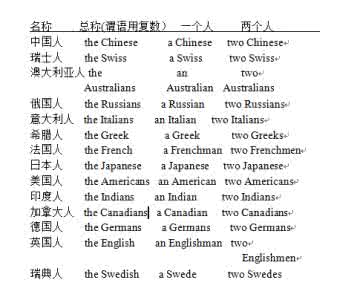
普通名词又分为可数名词和不可数名词。
▲可数名词是可以用简单的数词进行计数的名词,如: box, child, orange;
▲不可数名词是不可以用简单的数词进行计数的名词。如:water, news, oil, population, information .
2、英语可数名词的单复数:英语可数名词有单数和复数两种形式。
1、名词由单数变复数的基本方法如下:
①在单数名词词尾加s。如:map → maps,boy→ boys,horse→ horses, table→ tables.
②s,o,x ,sh,ch结尾的词加es.如:class→classes, box→boxes, hero→heroes, dish→dishes, bench→benches.
[注]:少数以o结尾的词,变复数时只加s。如:photo→photos, piano→pianos.
③以辅音字母加y结尾的名词,变y为i,再加es。如:family→families, city→cities, party→parties.
④以f或fe结尾的名词,变f或fe为v,再加es。如:shelf→shelves, wolf→wolves, life→lives, knife→knives.
2、不规则变化:man→men, woman→women, sheep→sheep,tooth→teeth, fish→fish, child→children, ox→oxen, goose→geese
不可数名词一般没有复数形式,说明其数量时,要用有关计量名词。如:a bag of rice→two bags of rice, a piece of paper→three pieces of paper, a bottle of milk→five bottles of milk.
3、名词所有格:
名词所有格表示所属关系,相当于物主代词,在句中作定语、宾语或主语。其构成法如下:
(1)表示人或其它有生命的东西的名词常在词尾加‘s。如:Childern‘s Day(儿童节), my sister‘s book(我姐姐的书)
(2)以s或es结尾的复数名词。只在词尾加‘。如:Teachers‘ Day(教师节)
(3)有些表示时间、距离以及世界、国家、城镇等无生命的名词,也可在词尾加‘s. 如: 2 / 52
today‘s newspaper(今天的报纸), ten minutes‘ break(十分钟的课间休息),
China‘s population(中国的人口).
(4)无论表示有生命还是无生命的东西的名词,一般均可用介词of短语来表示所有关系。如: a fine daughter of the Party(党的好女儿).
2、[注解]:
① ?s还可以表示某人的家或者某个店铺,如:my aunt‘s(我阿姨家), the doctor‘s(诊所)
② 两人共有某物时,可以采用 A and B‘s 的形式,如:Lucy and Lily‘s bedroom(露西和丽丽合住的卧室)
③ ―of+名词所有格/名词性物主代词‖,称为双重所有格,如:a friend of my father‘s(我父亲的一位朋友), a friend of mine(我的一位朋友)
4、名词或代词作主语时和谓语之间的单复数的一致问题:
1、和谓语基本保持单复数的一致,即:主语是可数名词单数或不可数名词时,谓语动词用单数形式:如:The computer was a great invention.(计算机是个了不起的发明)The water in the glass is very cold.(玻璃杯里的水很冷)
2、集体名词(如family, class, team, group, row, police, school等)做句子主语时,
如果表示整体概念,则谓语用单数形式,如:Class Three is a very good class.(三班是好班)
如果表示其中的所有成员时,则谓语用复数形式,如:Class Three have a map of China.(三 班有张中国地图)
3、Chinese, Japanese, fish, sheep, people等表示单个时谓语用单数,表示许多时,谓语用复数。如:There is a sheep in the yard.(院子里有只绵羊) / There are some sheep in the yard.(院子里有一些绵羊)
4、maths, news等虽然有s结尾,但不是复数,因此谓语仍用单数:The news is very exciting. (这个消息令人兴奋)
5、glasses, shoes, socks, trousers, gloves等名词往往用复数形式,故谓语用复数。如: The trousers are very cheap and I want to take them.(裤子很便宜,我想买)
6、a lot of 后跟名词复数时谓语用复数形式,跟不可数名词时谓语用单数形式。如:A lot of students are playing baseball now.(现在有许多学生在打垒球) A lot of time was wasted on that work.(大量的时间花在了那个工作上)(被动句)
7、and 连接两个名词做主语时,谓语原则上用复数,但是两个名词若构成一个整体事物时,谓语则用单数。如:The teacher and his son are picking apples now.(老师和他的儿子在摘苹果) / Fish and chips is very famous food. (鱼和薯条是一种出名的食品)
8、 there be 句型中be的单复数一般由靠近的名词决定。如:There is a table and four c hairs in the room.(房间里有一张桌子和四张椅子)
9、用both…and…连接两个事物做主语时,谓语一般用复数。如:Both you and I are required to be here tomorrow.(你和我明天要求都来)
10、主语中含有with的短语时,谓语单复数由with之前的人物决定。如:A woman with a 7-year-old child was standing at the side of the road. (一名妇女带着一个七岁的孩子(当时)就站在路边)
11、either…or…或者 neither…nor…连接两个人物做句子主语时,谓语采用就近原则。如:Either you or he is right.(要么是你对,要么是他对。/你和他有一个人是对的) / Neither you nor I am going there.(你和我都不打算去那里)
12、表示一段时间或长度概念的复数名词做主语时,谓语一般用单数。如:Two months is not a short time.(两个月不是个短时间)Two thousand kilometers is quite a long distance(距离).(两千千米是相当长的一段距离)
3 / 52
13、主语中含有half of… / (three quarters)of… / all (of) the ….等词语时,谓语的单复数由名词确定,如:Over three quarters of the information on the Internet is in English.(因特网上四分之三以上的信息是用英语写的) / A third of the students were playing near the lake.(学生的三分之一(当时)正在湖边玩耍) / All of the water in these rivers has been polluted.(这些河流中的水已经被污染了)(被动句)
但是,population一词又有特殊情况: What‘s the population of China?(中国人口是多少?)(句子用单数) / Three quarters of the population in this city are Arabs(阿拉伯人).(这个城市四分之三的人口是阿拉伯人)(句子用复数)
三、代词:
1、代词的分类:英语中代词分为:人称代词、物主代词、反身代词、指示代词、关系代词、疑问代词、连接代词和不定代词等等。
2、人称代词:人称代词代替人和事物的名称,分为主格和宾格两种形式。
第三人称单数 第一第二第一人 第二人 阳性 阴性 中性 人称人称第三人称复数 称单数 称单数 复数 复数
I she it we you 主 you (你) he they (他们,
格 (我) (他) (她) (它) (我们) (你们) 她们,它们)
me her it us you 宾 you (你) him them (他们,
格 (我) (他) (她) (她) (我们) (你们) 她们,它们)
1、主格用来作句子的主语、表语。如: I often go shopping on Sundays.(星期天我常去购物) / Are they from Brazil?(他们是巴西人吗?) / Where have they gone?(他们上哪儿去了?) / That‘s it.(就那么回事) / It‘s he!(是他!)
2、宾格用来作及物动词或者介-www.wenzhangwo.com-词的宾语。如:Who teaches you English this year?(今年谁教你们的英语?) / Help me!(救救我!) / We often write letters to her.(我们常给他写信)
3、人称代词作表语或者放在比较状语从句连词than或as之后时,可以用主格形式,也可以用宾格形式,口语中大多用宾格。如:--Who is it?(是谁?) –It‘s I/me.(是我。)
三个不同人称同时出现,或者主语中包含―我‖时,按照―you→he→I‖的顺序表达。如:
Both he and I are working at that computer company.(我和他都在那家电脑公司上班) –Who will go there?(谁要去那儿?) –You and me.(你和我)
人称代词it除了可以指人指物之外,还可以表示―时间、天气、温度、距离、情况‖等含义,此外还可以作―非人称代词‖使用,替代作主语或者宾语的不定式、动名词或者名词性从句。如:--What‘s the weather like today?(今天天气怎样?)—It‘s fine.(天气晴好) / --What‘s the time?(几点啦?) –It‘s 12:00.(12点) / It‘s a long way to go.(那可要走好长的路) / It took him three days to clean his house.(打扫屋子花了他三天的时间) / It is very clear that the public want to know when these men can go into space.(很显然,公众想知道这些人什么时候能进入太空) / We found it very difficult to learn a foreign language well.(我们发觉要学好一门外语是非常困难的)
3、物主代词:说明事物所属关系的代词,分为形容词性和名词性两种。
第三人称单数 第一人第一人 第二人 第二人阳性 阴性 中性 称复 第三人称复数 称单数 称单数 称复数 数
your his her its our your 形容 my their (他们的,她们
词性 (我的) (你的) (他的) (她的) (它的) (我们(你们的,它们的)
的) 的)
Yours his hers its ours yours 名词 mine theirs(他们的,她们
4 / 52
(我们(你们的,它们的)
的) 的)
1、形容词性物主代词只能作句子中名词的修饰语,后面要跟名词。如:
Is that your umbrella?(那是你的伞吗?) / I often go to see my aunt on Sundays.(我经常在星期天去看望阿姨) / They are their books.(是他们的书)
2、名词性物主代词相当于名词,既代替事物又表明所属关系,在句子中往往独立地作主语、宾语或者表语,后面千万不可以跟名词。如:
This is your cup,but where is mine?(这是你的杯子,可我的在哪儿?) / Your classroom is very big, but ours is rather small.(你们的教室很大,我们的相当小)
3、―of + 名词性物主代词‖称为双重所有格,作定语时放在名词的后面。如:
A friend of mine came to see me yesterday.(我的一个朋友昨天来看我了) (指若干朋友中有一个来看我。)
[试比较] My friend came to see me yesterday.(我的朋友昨天来看我了)(指我的那个特定的朋友来看我。)
4、反身代词:表示谓语的动作与主语有关或者宾语补足语的动作与宾语有关。
反身代词是一种表示反射或强调的代词。它的基本含义是:通过反身代词指代主语,使施动者把动作在形式上反射到施动者自己。因此,反身代词与它所指代的名词或代词形成互指关系,在人称、性、数上保持一致。
性 (我的) (你的) (他的) (她的) (她的)
1、反身代词在句子中作宾语表示反射(指一个动作回到该动作执行者本身)。如:
Don‘t play with the knife, you might hurt yourself.(不要玩刀子,那会割伤你的)
2、在句子中作同位语表示强调(即用来强调名词或代词的语气)。如:
The story itself is good. Only he didn‘t tell it well.(故事本身是好的,只是他没有讲好)
指示代词: 指示说明近处或者远处、上文或者下文、以前或者现在的人或事物。
What‘s this?(这是什么?) / That model plane is made of plastic.(那只模型飞机是塑料做的)(被动句) / Remember never to do such things.(记得永远不要做这样的事情) / Do the same as the teacher tells you. (按老师说的做)/ ---Who is it?(是谁?) ---It‘s me!(是我!)
6、关系代词:用来引导定语从句的代词叫关系代词,参见后面的定语从句。
1、关系代词who 、which、 that 、whom 等,将定语从句和主句连接起来。英语中的关系代词一方面在从句中担任一定的成分,另一方面又起连接作用。
如:The student who is drawing a picture is in Grade One.(正在画画的学生是一年级的) 5 / 52
2、关系代词who / whom指人,如果作从句的宾语,则有时省略。如:
Do you know the man who is wearing a red hat? (你认识那个戴着红帽子的男人吗?)
3、关系代词which 指物,如果作从句的宾语,则有时省略。如:Have you found the book which you lost several days ago?(你找到几天前丢失的那本书了吗?)
4、关系代词that既可指人也可指物,如果作从句的宾语,则有时省略。如:Can you see the man/dog that is running along the river bank ?(你看得见顺着河跑的男人/狗了吗?)——好文章—— 7、连接代词:用来引导宾语从句、主语从句或表语从句的连接词称连接代词。
英语中连接代词主要有:what(什么),who(谁),whom(谁),which(哪个),whose(谁的)。详见相应从句。
8
事), anyone(任何人), anybody(任何人), nothing(没事),nobody(没有人), no one(没有人), everything(一切), everyone(每个人), everybody(每个人). (1)some和 any 的用法:
some一般用于肯定句中,意思是―几个‖、―一些‖、―某个‖作定语时可修饰可数名词或不可数名词。如:I have some work to do today. (今天我有些事情要做)/ They will go there some day.(他们有朝一日会去那儿)
some 用于疑问句时,表示建议、请求或希望得到肯定回答。如:Would you like some coffee with sugar?(你要加糖的咖啡吗?)
any 一般用于疑问句或否定句中,意思是―任何一些‖、―任何一个‖,作定语时可修饰可数或不可数名词。如:They didn‘t have any friends here. (他们在这里没有朋友)/ Have you got any questions to ask?(你有问题要问吗?)
any 用于肯定句时,意思是―任何的‖。Come here with any friend.(随便带什么朋友来吧。) (2)no和none的用法:
no是形容词,只能作定语表示,意思是―没有‖,修饰可数名词(单数或复数)或不可数名词。如:There is no time left. Please hurry up.(没有时间了,请快点) / They had no reading books to lend.(他们没有阅读用书可以出借)
none只能独立使用,在句子中可作主语、宾语和表语,意思是―没有一个人(或事物)‖,表示复数或单数。如:None of them is/are in the classroom.(他们当中没有一个在教室里) / I have many books, but none is interesting.(我有很多的书,但没有一本是有趣的) (3)all和both的用法:
all指三者或三者以上的人或物,用来代替或修饰可数名词;也可用来代替或修饰不可数名词。 both指两个人或物,用来代替或修饰可数名词。all和both在句子中作主语、宾语、表语、定语等。如:I know all of the four British students in their school.(他们学校里四个英国学生我全认识) / --Would you like this one or that one? –Both.(你要这个还是那个?两个都要。)
all和both既可以修饰名词(all/both+(the)+名词),也可以独立使用,采用―all/both + of the +名词(复数)‖的形式,其中的of 可以省略。如:All (of) (the) boys are naughty.(是男孩都调皮) (4)every和each用法:
6 / 52
every是形容词,只能作定语修饰单数名词,意思是―每一个‖,表示整体概念;
each是形容词、代词,可用作主语、宾语、定语等,意思是―每个‖或者―各个‖,表示单个概念;each可以放在名词前,可以后跟of短语,与动词同时出现时要放在―be动词、助动词、情态动词‖之后或者行为动词之前
every和each都用作单数理解,但是下文中既可以用单数的代词(如he/him/his)也可以用复数的代词(如they/them/their)替代。如:Every one of the students in his class studies very hard.(他班上每个学生学习都很用功) / They are very busy. Each of them has something to do.(他们很忙,人人都有事干)
(5)either和neither的用法:
either意思是―两个中间的任何一个‖;neither是either的否定形式,意思是―两个都不‖。
neither和either在句子中可作主语、宾语和定语等,都用作单数。如:I don‘t care much for what to drink. Either of the two will do. (我不介意喝些什么,两个之中随便哪个都行) / --Will you go there by bus or by car? –Neither. I will go there by train.(你坐公车去还是坐轿车去?一个都不坐,我坐火车去。)
(6)other、the other和another的用法:
other意思是―另一‖、―另一些‖,有复数形式。在句子中可作主语、宾语和定语。another意思是―另外‖、―又一个‖,表示增加,在句中可作宾语和定语。如:
Some girls are singing under the big apple tree and others are sitting on the grass talking.(有些女孩在大苹果树下唱歌,别的就躺在草地上说话) / You have had several cakes. Do you really want another one?(你已经吃了好几块饼子了,你真的还要一块?) / I want another four books.(我还要四本书)
another(另外的,再一,又一)与the other(另外的一个) 主要从数量上区分,只有两个时用the other,在原先基础上增加用another。如: This is one of your socks. Where is the other one?(这是你的一只袜子,还有一只呢?) / I have eaten 4 cakes, but I still want another.(我已经吃了4块蛋糕,但是我还要以块。)
others与the others的主要区别:others指―剩余的人/物‖(指大部分);the others指―其余的人/物‖,(指全部)。如:A few students are playing soccer while others are watching them.(有几个学生在踢足球,其他一些人在观看) / Two of the ten boys are standing and the others are sitting round them.(十个男孩中有两个站着,其他人都围着他们坐着。)
(7)many和much的用法:
many意思是―很多‖,与可数名词复数连用;much意思是―很多‖,与不可数名词连用。它们在句中可作主语、宾语和定语等。如:I don‘t have many friends here.(在这里我没有很多的朋友。) /Many died in the bus accident.(许多人在公交车祸中丧失) / We can learn much with the help of him.(在他的帮助之下我们能学到很多)
many和much一般用于否定句,肯定句中通常用a lot of 或者lots of; many / much用于肯定句时可以在前面加上so、very或too.如: There are a lot of people on the playground.(操场上有许多的人)/ They haven‘t got much work to do.(他们没有多少事情可做) / There are too many people in the room.(房间里人太多了。)
(8)few、little、a few、a little的用法:
few、little意思是―很少几个‖、―几乎没有‖,有否定的意思,a few、a little意思是―有几个‖、―有些‖,有肯定的意思 ;few、a few与可数名词连用或代替可数的事物, little、a little与不可数名词连用或代替不可数的事物。它们在句中可作主语、宾语和定语。如:
He is very poor and he has little money.(他很穷,几乎没有什么钱。) / Don‘t worry. There is still a little time left.(别着急,还有一点儿时间呢。) / In that polar region there live few people.(在那个 7 / 52
极地地区几乎不住人) / You can get a few sweets from him.(你可以从他那儿弄到一些糖果)
(9)复合不定代词somebody ,something ,anything, nothing ,eve rything, everybody等是由some , any ,no ,every, 加上body, thing 构成的,叫做复合不定代词,在句子中当单数使用。
somebody, something, someone 一般用于肯定句中;anything, anybody,anyone一般用于疑问句、否定句和条件状语从句中。修饰复合不定代词的定语,应放在它们的后面。如:Hey,Lily. There is someone outside the door.(嗨,丽丽,门外有人。) /Di(每个人)d you meet anyone when you came to school last Sunday?(上个星期天你来学校时见到什么人了吗?)/He has nothing much to do today.(他今天没有多少事情做)
(10)one与ones用来代替上文的一个或多个人或事物,前面可以加冠词、形容词、指示代词、which等。如: Which jacket would you like, this one or that one?(你要哪件夹克,这件还是那件? / I don‘t like the green ones.(我不喜欢绿色的那些)
(11)so可以代替一件事情,作句子的宾语或表语。如: I don‘t think so.(我认为不是这样的。) / He lost a book. So did I.(他丢失了一本书,我也是。)
(12)a lot of、lots of、a number of( /large numbers of)、a great deal of、plenty of的区别:五个―名词+介词‖短语都表示―大量,许多‖,a lot of(或lots of)既可以修饰不可数名词也可以修饰可数名词的复数形式,可以相应地换为much和many;plenty of―足够、大量‖,既可以修饰不可数名词也可以修饰可数名词的复数形式。 a number of / large numbers of只可以修饰可数名词复数形式(它修饰的词作主语时谓语用复数形式)可以换为some、many、a lot of、plenty of。 a great deal of只可以修饰不可数名词(它修饰的词作主语时谓语用单数形式)可以换为much。 如:A lot of people think that time is money.(许多的人认为时间就是金钱。) / I don‘t have to do it in a hurry because I have plenty of time.(我用不着赶忙,因为我有充足的时间。) / I have a number of letters to write today.(今天我有好多信要写) / I spend a great deal of time/money on shopping.(在购物方面我花费了大量的时间/金钱。)
(13)none、no one、nobody的区别:no one和nobody都表示―没有人‖,仅指人,后面不跟of 短语,作主语时谓语用单数形式;none表示―没有一个人/物‖,可指人也可以指物,后面可跟of短语,作主语时谓语可用单数也可用复数。如:No one knows how he managed to get the ticket.(没有人知道他是怎样搞到那张票的) / Nobody handed in his/their composition(s) yesterday.(昨天没有一个人交作文。) / None of my friends came to see me that day.(那天没有一个朋友来看我。)
9、相互代词:表示相互关系的词叫相互代词。
each other ,one another是相互代词,译成―互相‖,可以通用。each other表示两者之间,而one anther表示许多人之间。它们有所有格形式each other‘s ,one another‘s。如: We must help each other when we are in trouble.(我们身处困境时要互相帮助。) / They sat there without talking to one another / each other.(他们坐在那儿,互相都不说话。)
10、疑问代词:用来提出问题的代词称为疑问代词。
1、who、whom、whose、what、which、whoever、whatever、whichever主要用于特殊疑问句中,一般放在句首。口语中也常用who代替whom作宾语,但在介词后则只能用whom。如: Who(m) did you invite to your birthday party?(你都邀请了谁参加你的生日聚会的?) / What does she want to be when she grows up?(她长大了想干什么?)
2、who 和whom只能独立使用,其中who可以作句子的主语、表语或动词的宾语,whom只能作谓语动词的宾语;而what、which、whose等既可以独立使用作主语、表语和宾语,也可以与名词构成疑问短语。如: Who is that man?(那男的是谁?) / What colour are their hats?(他们的帽子是什么颜色?) / Which car was made in Germany?(哪辆车是德国造的?)(被动句) 注意这个提问:The man in the car is my father.(车里的男人是我父亲)
8 / 52
→Which man is your father?(哪个男人是你的父亲?)
3、which除了可以询问指代的情况之外,还可以针对说明人物的时间、地点、岁数、颜色、大小、状况等进行提问。如:People there live a very sad life.(那里的人生活凄惨) →Which people live a sad life? (哪些人生活凄惨?)/ --Which hotel have you booked for your holiday?(为了度假你预订了哪家旅馆?)—The biggest one in Haikou.(海口最大的那家旅馆) 4、疑问代词不分单复数,视它所替代的人或事物决定单复数,但是通常用单数;如果修饰名词,则以名词的单复数为准。如:Who is (are) in that playhouse?(谁在游戏房里?) / What is that? (那是什么?)/ What are those? (那些是什么?) / What colours do they have?(它们有哪些颜色?)
四、数词:
1、分类:数词有基数词和序数词两种。英语的数词可以作句子的主语、宾语、表语和定 语。 2、基数词:表示数目的词叫基数词。 1、
million,10000000→ten million, 100000000→one hundred million,
108→one hundred and eight, 146→one hundred and forty-six, 500→five hundred , 1001→one thousand and one, 1813→one thousand eight hundred and thirteen.
2、[注]:(1)百位与十位之间要加and;十万位和万位,亿位和千万位之间通常也要加and。 (2)英语用千、百万等单位计数,大数字从右向左看, 每隔三位划一逗号,倒数第一个逗号之前要用thousand,倒数第二个逗号之前要用million,倒数第三的逗号之前要用billion表示。
(3) hundred、 thousand、 million作数词时,不用复数,前面可以加上one, two, …等其它数词。用作名词时复数表示―成…上…‖,后面必须要有of,前面可以加上some,many,several等词。如:five hundred(五百), hundreds of(成百上千的), ten thousand(一万), thousands of(成千上万的), millions of(成百万的)
3、序数词:表示顺序的数词叫序数词。 1、 英语的序数词基本变法:
(1) 一般在基数词后加th,(2)-ve结尾的改为-fth,(3)-ty结尾的改为-tieth,(4)熟记特殊词。 2、序数词如下:
9 / 52
1000th→one thousandth, 1000000th →one millionth., 第703→the seven hundred and third, 第5480→the five thousand four hundred and eightieth.
3、注:(1)两位以上的序数词仅个位数部分用序数词,其余部分仍用基数词。如:thirty-sixth, (2) 使用序数词时一般加定冠词the. 如:I‘m in the third grade.
(3) 序数词作―几分之几‖讲时,有复数形式。如:1/5→one fifth ; 2/3→ two thirds ; 4/7→ four sevenths ; 1/2→ a half ; 1/4→a quarter ; 3/4→ three quarters ; 50%→ fifty hundredths ( fifty per cent).
4、数词的用法:
1、表示年份:2002: twenty thousand and two ; 1976 : nineteen seventy-six. 2、表示日期: 12月1日: Dec.1st或the first of December;2002年11月8日: Nov. 8th, 2002. 3、表示时刻: 5:15→ five fifteen或a quarter past five ; 8:30→ eight thirty或half past eight ; 10:45→ ten forty-five或a quarter to eleven.
4、表示编号:Room 105→Room one 0 five; Bus No.13→Bus Number Thirteen; P.5→Page Five; Tel.No.7658659→Telephone Number seven-six-five-eight-six-five-nine 5、小数的读法:5.7→ five point seven, 0.16 →zero point one six.
6、―半‖的表达: 1/2→half, 半小时→half an hour, 1.5小时→one and a half hours或one hour and a half.
7、序数词前面加the时,表示顺序,加a/an时表示―再一、又一‖。如:The third lesson is rather difficult.(第三课相当难)/ Shall we read the text a third time?(我们把课文读第三遍,好吗?) 五、冠词
1、冠词分类及读法:
英语中冠词有不定冠词和定冠词两种,常放在名词的前面,用来限定名词的意义,起泛指或特指的作用。定冠词the读法:单独念时读[Ti:],在句子中常发[Ti ](元音之前)或者[T[](辅音之前);
不定冠词a/an的读法:单独念时读 [ei ]/[An ];在句子中常发 [[]/[[n]。 2、不定冠词a / an的用法:
不定冠词a / an用在单数名词的前面,a用在辅音开头的词前面; an用在元音开头的词的前面。 不定冠词的基本用法:
表示某一个人或东西,但不具体说明何人或何物。如:There is a dog lying on the ground.(有一只狗躺——牛宝宝日记本——在地上。)
(2) 表示某类人或事物,以区别于其他种类。如:A elephant is much stronger than a man.(大象
10 / 52
比人强壮多了。)(不能译为:一头大象比一个人强壮。)
表示某类人或事物中的任何一个。如:He is a teacher of English.(他是英语教师。)
(4) 表示―一‖这个数量。如:There is a table and four chairs in that dining-room.(在那个餐厅里有一张桌子和四把椅子。)
几个用不定冠词的习语:a bit(一点), a little(一点), a few(几个), a lot (许多), a kind of(一种), a pair of(一副、一双), a number of(大量的), a piece of (一张、一片), half an hour(半小时), have a good time(玩得开心), have a cold(感冒), make a noise(发出嘈杂声), have/take a (rest等)(休息)一会儿,等等。
3、定冠词the的用法:定冠词the用在可数名词的单数或复数或不可数的名词前面。 定冠词的基本用法:
表示特指的人或事物。如:The man with a flower in his hand is Jack..(手上拿着一朵花的男人是杰克)
指谈话双方都熟悉的人或事物。如:Look at the blackboard,Lily.(莉莉,请看黑板。)
复述前面提到过的人或事物。如:There is a man under the tree. The man is called Robert.(树下有个人, 那个人叫罗伯特。)
表示世界上独一无二的事物。如:The earth turns around the sun.(地球绕太阳旋转。)
用在表示方位的名词前面。如:There will be strong wind to the south of the Yangtze River.(长江以南地 区将会刮大风。)
在序数词和形容词最高级的前面。如:Who is the first one to go?(谁第一个去?) / Of all the stars, the sun is the nearest to the earth.(在所有的恒星之中太阳离地球最近)
常用在乐器名称的前面。如:He began to play the violin at the age of 5.(五岁时他开始拉小提琴)
用在江河、海洋、山脉等名称的前面。如:I have never been to the Himalaya Mountains.(我从来没有去过喜马拉雅山)
用在含有普通名词的专有名词的前面。如:He is from the United States of America.(他来自美利坚合众国)
(10)用在姓氏之前表示一家人。如:The Greens are going to Mount Emei next month.(下个月格林一家要去峨眉山)
(11)same之前一般用the。如:Lucy and Lily look the same.(露西和莉莉看上去长得一样)
(12)几个用定冠词的习语:at t-牛bb文章网-he same time (与此同时),make the bed(铺床),in the end(最后),all the time(一直),by the way(顺便说一下),on the way(在路上)等等。
4、一些不用冠词的情况:
(1) 专有名词和(第一次使用)一些不可数名词时前面通常不用。如:China is a very large country.(中国是个大国) / Man needs air and water.(人类需要空气和水)
(2) 名词前已有指示、物主或不定代词作定语时不用。如:My pen is much more expensive than yours.(我的钢笔比你的昂贵多了)
周名,月名或季节名前一般不用。如:He was born on Monday, February 18,1995.(他出生在1995年二月十八日,星期一) / They usually plant trees on the hills in spring.(春天他们通常在山上植树)
(4) (第一次使用)复数名词表示人或事物的类别时不用。如:Men are cleverer than monkeys.(人比猴子聪明)
三餐饭前不用。如:We have breakfast at home and lunch at school.(我们在家吃早饭,在校吃午饭)
节、假日前一般不用。如:On Children‘s Day the boys often get presents from their parents.(在 11 / 52
儿童节,这些男孩经常得到父母的礼物)
球类名词前不用。如:The children play football on Saturday afternoons.(孩子们星期六下午踢足球)
城市的重要/主要建筑物名称前不用。如:They are now at People‘s Cinema.(他们此刻在人民电影院)
(9) 一些习惯用语中不用。如:? at / to / from / out of / after / for school; ? in / to / for / after class; ?in / to / out of / into bed; ? after / at/ from / out of / to work; ? at / to sea; ? in / from / down / to town; ? at / from home; ? at / for / to breakfast/lunch/supper; ? at night/noon/midnight; ? on foot; ⑴ go to school/bed; ⑵ on top of; ⑶ in front of; ⑷ on show/display/duty/watch; ⑸ in / out of hospital; ⑹ at all; ⑺ on/in time; ⑻ at first/last/once; ⑼ in Chinese/English,etc.; ⑽ take care of
六、形容词、副词:
1、形容词:用来说明或修饰名词、代词的词称为形容词。
1、形容词的句法作用:作句子中名词的定语、句子的表语以及宾语补足语。
2、形容词在句子中的位置:
?作定语时放在名词的前面,且音节少的词放在音节多的词之前。如:a big yellow wooden wheel(一个黄色的大木轮)
?作表语时放在连系动词之后。如:The price sounds reasonable.(这个价格听起来算是合理) ?作宾语补足语时放在宾语之后。如:We must try our best to keep our environment clean.(我们必须尽力保持我们的环境清洁)
?后置的情况:
①修饰复合不定代词时放在代词之后。如:Something serious has happened to him.(他发生了严重的事故)
②与表示―长、宽、高、重、老、远离‖的词连用时形容词后置。如:He‘s 1.8 metres tall.(他身高1.8米。)The moon is about 380,000 kilometres away from the earth.(月球离地38万公里)
3、有关形容词的用法辨析:
? whole与all:记住两个词序:-牛宝宝日记本-① the whole + 名词; ②all (of) the + 名词。如:He was busy the whole morning.(整个早晨他都很忙) / He can remember all the words he learns.(他能记住学过的所有单词)
? tall与high, short与low:指人的个子时用tall与short;指其他事物时一般用high与low。如:He‘s very tall/short.(他个子高/矮) / Tall trees are standing on both sides of that avenue.(大道的两侧有高大的树木) / A few people live on high mountains.(少量的人住在高山上)
? real与true:real一般指东西的真假,译为―真的‖;而true则指事情或消息的可靠性,译为―真实的‖。如:This is a real diamond(钻石) and it‘s very expensive.(这是货真价实的钻石,非常贵) / --Is that true?—Yes. I heard it with my own ears.(那真实吗? 是的,我亲耳所听)
? interested与interesting的区别:interesting指人或东西―有趣的‖,作定语或表语,而interested则表示人对别的事物―感兴趣的‖,只能作表语。如:The man is very interesting and all the children like him. (这个人很有趣,孩子们都喜欢他)/ This book is interesting and you can really enjoy yourself.(这本书很有趣,你会真正获得享受) / I am interested in science.(我对自然科学感兴趣)
? such用法: such + a(n) + 名词(单数)(+that从句)。如:I have never seen such a foolish(愚蠢的) boy.(我从来没有见过这么蠢的男孩) / He had such a terrible accident that he could never forget it.(他遭遇了这么可怕的事故,他永远也不会忘记)
? good与well:表示―好‖时,作定语或表语用good,作状语用well;表示―(身体)好‖时用well. 12 / 52
如:Doing sports is good for us.(进行运动对我们有益) / Study well and make progress every day.(好好学习,天天向上) / --How are you?—I am very——http://www.niubb.com/—— well.(你好吗?我很好。)
? nice与fine:的区别:nice表示令人愉快的,可以指东西、人物外表等;fine一般指身体或天气好。如:Let‘s go and share(分享) the nice cake.(我们去分享那块美味的蛋糕吧) / She is a nice girl.(他是个漂亮的姑娘) / What a fine day!(多好的天气!) /He‘s fine recently(最近).(近来他身体不错)
? too much与much too:too much表示―太多的‖,修饰事物数量;much too表示―太过,过分‖,修饰形容词或副词。如:I am full because I have had too much rice.(我饱了,因为我吃了太多的米饭) / That coat is much too dear.(那件大衣太贵了)
? quick、fast与soon:quick与fast基本同义,quick往往指反应速度快,fast往往指运动速度快,而soon则表示时间上很快即将发生。如:After a quick breakfast, he hurried to school leaving his bag at home.(匆匆地吃过早饭,他朝学校赶去,却把书包忘记在家) / A train is much faster than a bus.(火车比公共汽车快得多) / His father will be back to China very soon.(他父亲很快就要返回中国)
?lonely与alone:lonely是表示心理活动的形容词,意思是:―孤独的,寂寞的‖,作定语或表语;alone的意思是:―独自的,单独的‖,指无人陪伴,仅作表语,(作为副词的alone可作状语)。如:He lives alone but he doesn‘t feel lonely.(他一人独住,但是并不感到孤独)/ He is a lonely person. You can not easily get on well with him.(他是个孤独的人,你要和他相处好实在不易)
⑴ other与else的区别:两个词都可以作形容词,但是用法不同,other放在名词前;else修饰不定代词、疑问词、little、much,后置,另外,or else表示―否则‖,是连词。如:The other students are on the playground.(其他学生在操场上) / Who else can work out this maths problem?(还有谁能解出着道数学题?) / This is nobody else‘s money. It‘s mine.(这不是别的什么人的钱,是我的。) / Do you have anything else to say for yourself?(你还有什么要为自己说的吗?
⑷ living、alive、live、lively的区别:四个词都来源于动词live―生活、居住‖。
living读[?liviN]有三个意思:①―活着的、现存的‖,作表语或定语,②―一模一样的、逼真的‖,③相当于lively,意思是―强烈的、活泼的‖;
live读[laiv],指东西―活的‖,可以替换为living;
alive读[[?laiv]作表语,指人―活着的‖,如果作定语,则放在名词的后面;
lively读[?laivli]有三个意思:①有生气的、活泼的、快活的,②(色彩)鲜艳的,③生动的、真实的。
例如:A living language should be learned orally(口头上).(活的语言应该从口头上学)(被动句) / We have a living hope that you will succeed.(我们强烈地希望你能成功) / Is she still alive?(她还活着吗?) / They are the happiest children alive.(他们是活着的最开心的孩子) / This is a live fish.(这是条活鱼) / A live wire(电线) is dangerous.(有电的电线是危险的) / She is as lively as a kitten(小猫).(她像小猫一样可爱) / He gave a lively description of the football match.(他生动地描述了那场足球赛)
⑹ the poor(穷人们) / the rich(富人们)等用法:―the+形容词‖这一结构可以表示一类人物,复数含义。如:We must try our best to help the poor.(我们应该尽力帮助穷人们) / The rich never know how the poor are living.(有钱人哪知穷人怎么过日子)
2、副词:用来说明事情发生的时间、地点、原因、方式等含义或说明其它形容词或副词程度的词叫做副词。
1
13 / 52
2、副词在句子中的位置以及作用:
?作状语:
① 时间副词:一般放在句首或句尾,注意,early、late、before、later、yet等一般放在句尾,already、just一般放在动词的前面。如:We will visit the Great Wall tomorrow.(我们明天要去参观长城) / They have already been to the UK twice.(他们去过英王国两次) / Soon the lost boy found his way back home.(不久迷路的孩子找到了回家的路)
② 频度副词:一般放在be动词之后或者助动词与主要动词之间,但sometimes、often等还可以放在句首或句尾,usually可放在句首,once可放在句尾,twice、three times等一般放在句尾。如:Sometimes I get up early.(我有时起得早)/ The workers usually have lunch at the factory.(工人们通常在厂里吃午饭) / Take this medicine twice a day.(这种药一天吃两次)
③ 方式副词:一般放在行为动之后,suddenly可以放在句首、句尾或动词之前。如:Old people can hardly walk as quickly as young people.(老年人几乎不可能走得和年轻人一样快好文章) / Suddenly he saw a light in the dark cave(山洞).(突然,在黑黢黢的山洞里,他看见了一丝亮光) ④ 地点副词:一般放在句尾,但here、there还可放在句首。如:There you can see thousands of bikes running in all directions(方向).(在那里,你可以看到成千上万的自行车朝各个方向流动) / The frightened wolf ran away.(受到惊吓的狼逃开了)/ He walked out quietly and turned back soon.(他悄悄地走了出去,很快又返回)
⑤ 程度副词:修饰动词时,放在动词之前;修饰形容词或副词时,放在形容词或副词之前。但注意,enough总是放在被修饰的形容词或动词的后面;only位置比较灵活,总是放在被修饰的词的前面。如:I nearly forgot all about it if he did not tell me again.(如果他不再次告诉我,我几乎把那事全忘了) / It was so strange that I could hardly believe my ears.(它那么奇怪一直我都不能相信我的耳朵) / She got to the station early enough to catch the first bus.(她早早地赶到车站赶上了首班车)
⑥ 疑问副词:用于对句子的状语进行提问,位置总是在句首。如:When and where were you born?(你何时何地出生?)/ Why did little Edison sit on some eggs?(小爱迪生为什么要坐在鸡蛋上?)/ How do you do?(你好!)
⑦ 连接副词:用来引导主语从句、宾语从句和表语从句,在从句中作状语。How I am going to kill the cat is still a question.(我打算怎样杀死那只猫还是个问题)/ That is why everyone is afraid of the tiger.(那就是人人都害怕老虎的原因) / He wondered how he could do it the next day.(他不知道第二天怎样做那事)
⑧ 关系副词:用来引导定语从句,在从句中作状语。如:This is the place where Mr Zhang once 14 / 52
[文章窝] 爱华网
爱华网